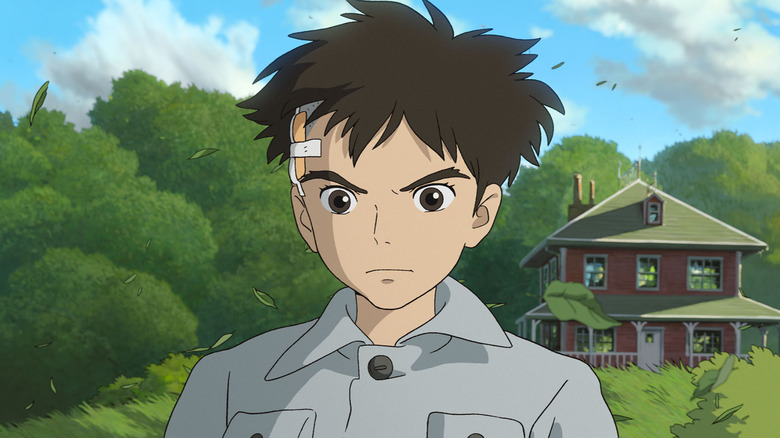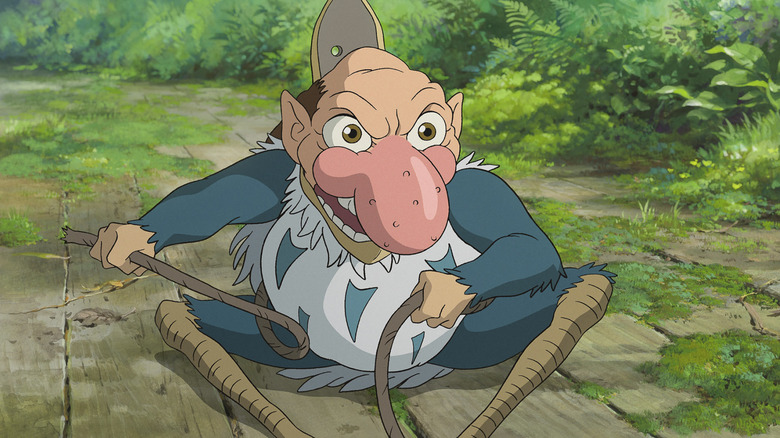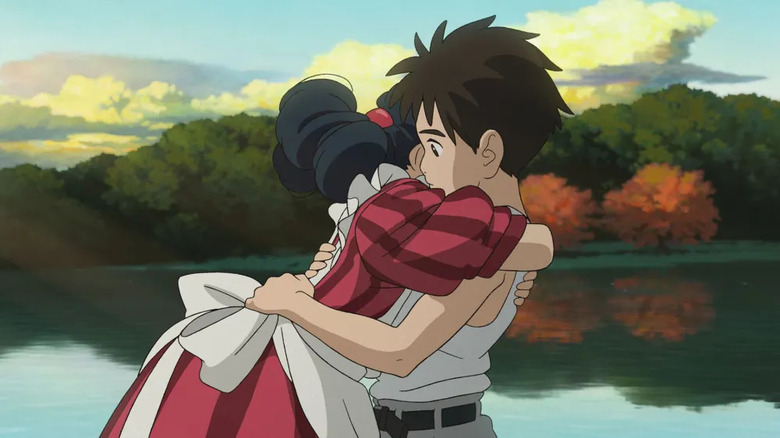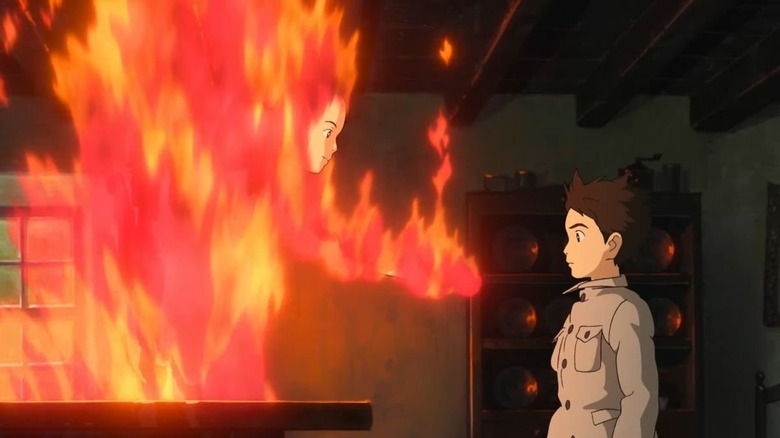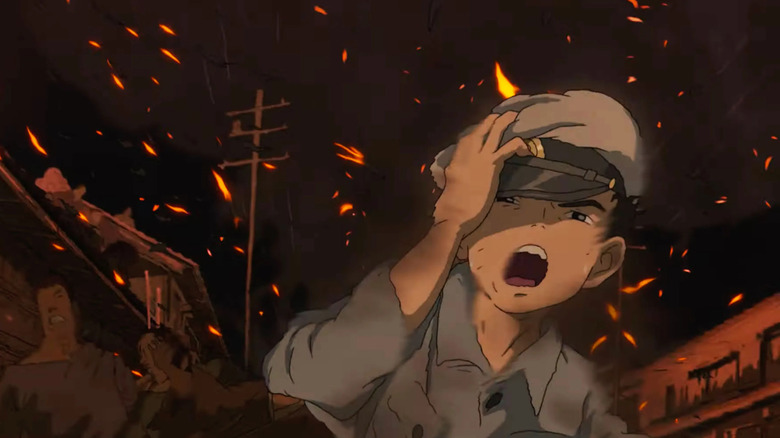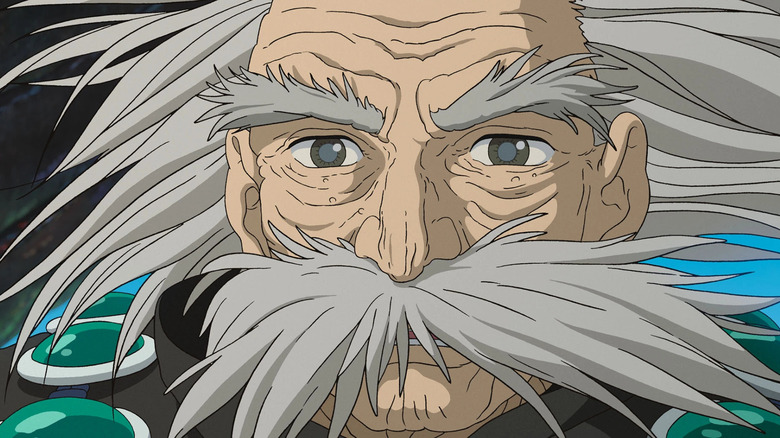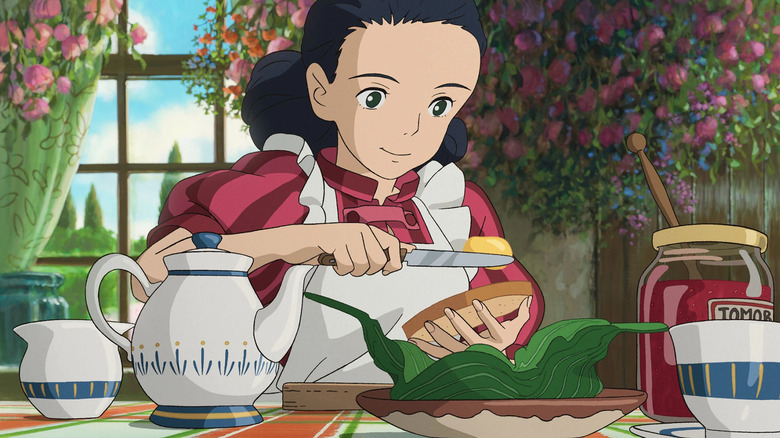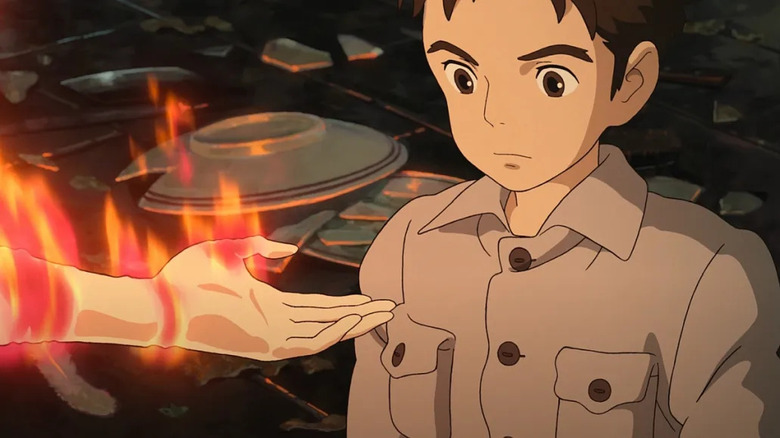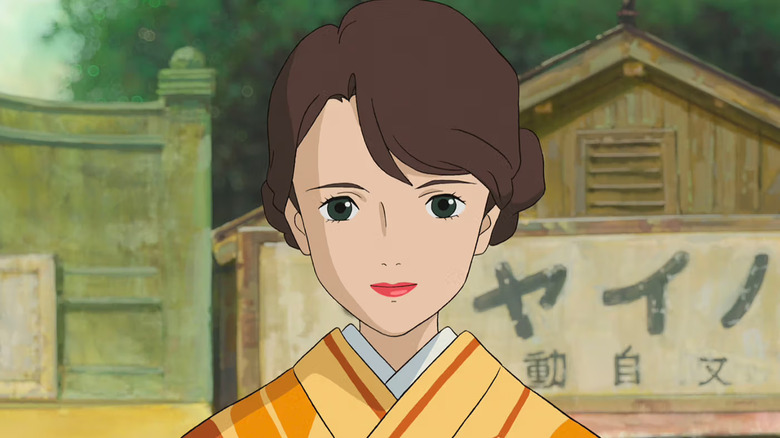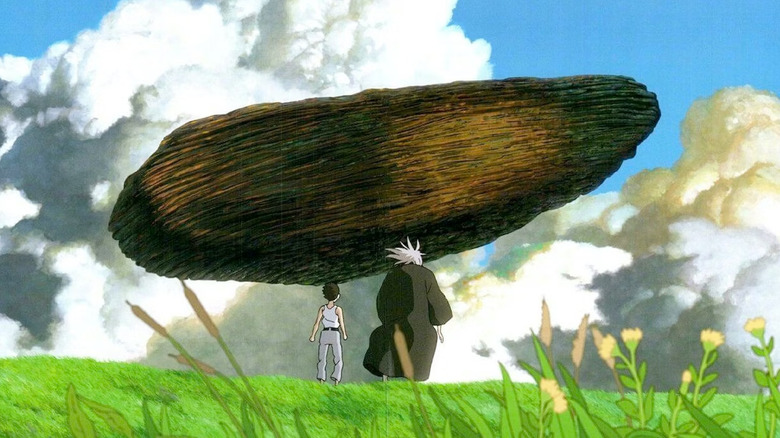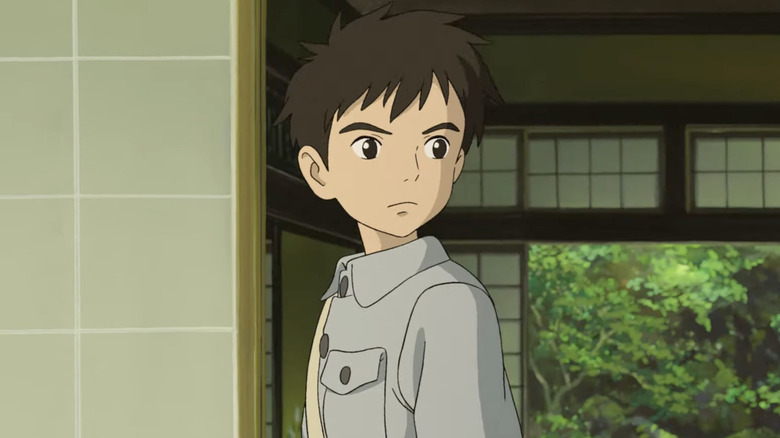The Ending Of The Boy And The Heron Explained
Contains spoilers for "The Boy and the Heron"
Hayao Miyazaki's first film in a decade, "The Boy and the Heron" follows Mahito (Soma Santoki), a young boy who loses his mother during WWII and is forced to move with his father to the home of his new love. Mahito struggles with his new surroundings as well as his father's new wife Natsuko (Yoshino Kimura), who also happens to be the younger sister of his late wife. Before long, Mahito finds himself being taunted by a bizarre Grey Heron (Masaki Suda) who holds a hidden power. The boy's continued interaction with the Heron eventually transports him to a fantasy world. He discovers stunning truths about his family lineage and starts down a path toward healing his unresolved grief.
With "The Boy and the Heron," Miyazaki delivers a moving and visually stunning experience. Fans will instantly fall in love with the film's animation style, which screams classic Studio Ghibli. The plot embodies the best of Miyazaki's storytelling; a grounded yet fantastical tale about a young boy discovering family secrets and dealing with lingering trauma. But, it's the finale of "The Boy and the Heron" that's especially memorable, a mixture of chaos and conclusions. It's a lot to take in during one sitting, so let's delve into everything that happens at the end of the story and what it all means.
What you need to remember about the plot of The Boy and the Heron
Before we jump into the ending of "The Boy and the Heron," let's go over some of the film's most important details. A year after Mahito's mother is killed in a hospital fire, he's forced to move to a new town to live with his father Shoichi (Takuya Kimura) and his new wife Natsuko, Mahito's aunt. The uneasiness of this new relationship and setting eventually becomes so unbearable for Mahito that he injures himself with a rock just so he can avoid school bullies and Natsuko. While he's recovering at home, he comes across a Grey Heron with magical abilities who proceeds to taunt him. He also comes to understand more about his family lineage, hearing a story about his Great Uncle (Shohei Hino) who disappeared in a now-crumbling tower he supposedly built.
When Natsuko disappears near the tower, Mahito is forced to embark on an adventure in an alternate world with the Heron. In this weird new world, Mahito encounters a younger version of an elderly woman from Natsuko's estate named Kiriko (Ko Shibasaki), a young woman with magical abilities named Himi (Aimyon), and his Great Uncle, who maintains the balance of these worlds. Mahito quickly finds himself involved in a growing power struggle that forces him to find Natsuko as fast as he can to not only bring her back to their world, but also express his acceptance of her.
What happens at the end of The Boy and the Heron?
After Mahito shows his acceptance of Natsuko by genuinely addressing her as his mother, they're ready to escape back to their reality. Unfortunately, their escape plans are upended when Himi is captured by the Parakeet King (Jun Kunimura), the leader of the people-eating parakeets who wish to take Great Uncle's power. Once Mahito rescues Himi, they head back to find Great Uncle and Mahito gets an unexpected proposition. It turns out that Great Uncle is looking for a familial successor and wants Mahito to take his position as the one who maintains balance between the worlds, which is represented through stacked stones. However, that blood relative must be free of malice and Mahito points out that his self-inflicted scar proves his personal malice.
Suddenly, the world starts to fall apart thanks to the Parakeet King's arrival and there's a scramble to escape. Just before everyone goes back to their times through their respective doors, Mahito offers Himi a chance to come back with them to their time. Himi refuses but expresses excitement about having Mahito as her son one day — she reveals that she's actually a younger version of Mahito's mother. Once Mahito and Natsuko return to their reality, they embrace Shoichi and the film ends on a flash-forward showing the close-knit family they've become.
What does the ending of The Boy and the Heron mean?
The big themes within Mahito's arc are undoubtedly the impact of continual grief, the need for self-forgiveness, and eventual acceptance. When Mahito arrives at Natsuko's estate, he's dealing with a lot of lingering feelings. He's continually haunted by his mother's death and the reality that she's gone forever. Mahito's desire to make her memory last causes him to be reclusive and resentful. Not to mention, with his father marrying his aunt, there are a lot of confusing emotions running through his head. Yet, when Mahito goes on this fantastical adventure and develops a more personal connection with his family, he is given plenty of opportunities for growth.
Mahito's mission to save Natsuko leads to him realizing that he actually cares about her. Meeting Himi gives him one last opportunity to say goodbye to his mother and move past his lingering grief over her death. And his final interaction with Great Uncle sees him openly acknowledge the emotional scars caused by his mother's passing and gain a new perspective on his personal malice. This leads to him gaining a new view of the world. Mahito is in a damaged state at the start of the film, but he goes through some real growth that allows him to start a new chapter in life.
The ending of The Boy and the Heron is classic Miyazaki
The final conversation between Mahito and Great Uncle also has real-world impact and plays into a larger theme seen throughout Miyazaki's work. Miyazaki is no stranger to focusing on younger characters (often young women or children) in his stories and having them take action against personal or world-threatening forces. Whether it's characters becoming involved in warring factions like in "Princess Mononoke" or "Naussica and the Valley of the Wind," or personal struggles of close allies like in "Howl's Moving Castle" or "Ponyo," Miyazaki loves to show young protagonists taking on seemingly insurmountable challenges. Yet, they always possess the moral fiber and determination needed to make the world a better place, and the same is true of "The Boy and the Heron."
Although Great Uncle believes that Mahito will be his successor and directly follow in his path, Mahito doesn't share in Great Uncle's persistence in keeping those blocks balanced. He doesn't believe that the world is better without malice since his own malice now acts as a reminder of his growth. Instead of taking up his Great Uncle's position, Mahito comes to realize that it's better to return to his world with Natsuko to carve a better path forward. In short, "The Boy and the Heron" is another example of Miyazaki's confidence in younger generations finding a better way.
The ending of The Boy and the Heron raises questions about succession
Great Uncle realizes that his time is running out and that a replacement is needed to maintain balance between the worlds. With his successor needing to be a blood-relative, Mahito fits the bill, and there's likely a part of Great Uncle that believes Mahito's personal anguish makes him an ideal candidate. However, Mahito actually feels differently to Great Uncle and rejects his offer to take over his role. The protagonist comes to the conclusion that returning to the real world will give him a better chance at creating change over residing there.
This dynamic between Great Uncle and Mahito is a reflection of the complicated nature of finding familial successors. When it comes to family-run businesses, there's often an assumption that younger generations will fall into their parents' roles to continue their legacy, though it's not always that simple. Hayao Miyazaki's son Goro Miyazaki may have even felt similar pressures, as he's also a director (he helmed the Studio Ghibli films "Tales from Earthsea" and "From Up on Poppy Hill"). His father's latest film reminds viewers of the pitfalls of trying to proclaim a bloodline successor and why younger generations carving their own paths can make for a better legacy.
The ending of The Boy and the Heron closes the family cycle
While Great Uncle's plan to find his successor mostly revolves around Mahito, it's fair to say that this wasn't always the case. After all, it would explain why Himi was summoned to this realm and why she seems to have a weird relationship with Great Uncle. She could've been offered the same deal and rejected it, just like Mahito does. This time around, though, Mahito's rejection is paired with the Parakeet King slashing the rocks and causing the world to fall apart. With this world now breaking, is this cycle the family has clearly been stuck in for quite some time finally broken?
Given that Mahito meets his mother at the age when she went missing as a child — which likely influences her happiness about returning to the real world — there's seemingly some kind of loop that's been established for younger generations to enter this world. Now that it's falling apart, it will be impossible for anyone to return and break this cycle that Great Uncle has been at the head of for many years. Perhaps if Mahito's children were to come to the area one day, they could be guided back into this world and given the same successor offer that their father received. For now, though, it appears as though the generational cycle that Mahito's family were stuck in is officially broken.
The Boy and the Heron offers a different perspective on WWII
Just like fellow Studio Ghibli founder Isao Takahata did with his devastatingly sad anime "Grave of the Fireflies," Hayao Miyazaki's "The Boy and the Heron" shows a different perspective of the Second World War than most audiences are used to — especially American audiences. In the opening moments of the film, viewers see the horrors of WWII through Japanese eyes and the destruction it causes for civilians. Fires spread across the villages engulfing many in smoke and flames, and the widespread fear can be felt in every character on-screen. It's rare to see the Japanese perspective during WWII in American media, and this is part of what makes Mahito's story so engrossing for viewers in the United States.
"The Boy and the Heron" is an empathetic tale that's a perfect reminder of who really suffers in wartime (the regular people) and the impact of the widespread loss felt during massive conflicts. Mahito's grief is what makes his story so instantly relatable for most and it allows viewers to immerse themselves into his perspective, even if they're not Japanese. Miyazaki's depiction of WWII in "The Boy and the Heron" most likely stems from his own experience as a child during and after the war. The protagonist feels very real in his reactions to the war and its aftermath, which comes from being Miyazaki's most personal main character ever. Mahito's actions during the finale make this a true coming of age story.
The ending of The Boy and the Heron is about rising from the ashes
"The Boy and the Heron" also depicts the struggles and hardships of a family starting again after dealing with tragedy. After Mahito's mother dies in a hospital fire, we see him still reeling from that loss a year later and it's easy to see why he isn't getting any better: He suffers from nightmares, he is determined to maintain his memory of his mother by any means, and he is resistant to Natsuko being his new mother for obvious reasons. The sheer shock and confusion of now having to see his aunt as his mother adds new layers to the tragedy. It's the main driving force for Mahito having to go on this journey of self-growth and find new meaning in the word family.
Mahito's reactions to his new existence are, of course, far from unreasonable. Losing a parent is never easy, especially at such a young age. Seeing one parent move on after losing the other can be equally as painful, never mind the fact that the newcomer is the sibling of the late parent in Mahito's situation. His arc hits all the strong emotions that are bound to be brought on by this series of events. Yet, his arc also displays the sense of acceptance and love that can overcome that kind of tragic loss and acts as an inspirational story for those going through similar trauma. Mahito's journey with his family isn't simple and comes with immense hardships, but these are the kinds of experiences that forge strong bonds.
Does the ending of The Boy and the Heron leave room for a sequel?
Could there ever be a sequel to "The Boy and the Heron?" At the moment, there's nothing in development and the chances of a follow-up from Miyazaki aren't good. First, the story doesn't present any real path forward for a follow-up film to work from. The story ends on a pretty conclusive note with Mahito and his reformed family moving away and the cycle seemingly broken so no future generations will get sucked into that fantasy world to meet Great Uncle. Even if the film is a global success critically and financially, neither Studio Ghibli nor Miyazaki are known for doing sequels. Of course, the biggest reason that "The Boy and the Heron" won't have a sequel is that Miyazaki is seemingly retiring.
Back in 2013, after the release of "The Wind Rises," Miyazaki announced his retirement with some famous last words. At a news conference covered by Entertainment Weekly, he said, "I know I've said I would retire many times in the past. Many of you must think, 'Once again.' But this time I am quite serious." Obviously, that didn't stick, but the official word from Studio Ghibli going into the release of his latest offering is that "The Boy and the Heron" will indeed be Miyazaki 's final film. As such, chances of a sequel are slim to none. Another director (his son, perhaps?) could opt to enter this world down the line, but, as "The Boy and the Heron" teaches us, sometimes walking your own path is the best way to go.
What does the ending of The Boy and the Heron mean for Miyazaki's career?
Is Hayao Miyazaki really retiring? The master filmmaker and animator has talked about retirement before only to start working on another film simply because he can't resist telling another captivating story, so his claims are always to be taken with a pinch of salt. However, it can't be denied that "The Boy and the Heron" features a more personal story, making it a worthy swan song for the maestro. In fact, back during the film's initial conception, producer Toshio Suzuki discussed Miyazaki's motivations during an interview with the Japanese TV show "Nichiyobi Bijutsukan" (meaning Sunday Art Gallery). "Miyazaki is making the new film for his grandson," Suzuki said (via IndieWire). "It's his way of saying 'Grandpa is moving on to the next world, but he's leaving behind this film.'"
Everything points to this being Miyazaki's final film — for real, this time. Given his reasoning for making "The Boy and the Heron" and the content of the film itself, it seems like the right project for Miyazaki to end his historic career on. But, despite the fact that the film was basically billed as Miyazaki's curtain call, some people within Studio Ghibli are now revealing that he may not be ready to step away from his desk after all. According to Studio Ghibli executive Junichi Nishioka, Miyazaki is still pitching film ideas to do after "The Boy and the Heron." So, this might not be the end for Miyazaki after all and fans of his work can hold out hope that there's another film in him yet.
